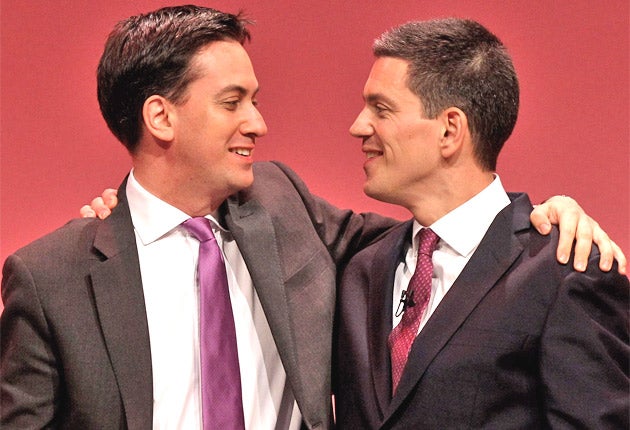Miliband plans to loosen unions' grip on Labour
The proposed changes would give registered supporters a vote to elect a new leader, watering down the power of the unions

Your support helps us to tell the story
From reproductive rights to climate change to Big Tech, The Independent is on the ground when the story is developing. Whether it's investigating the financials of Elon Musk's pro-Trump PAC or producing our latest documentary, 'The A Word', which shines a light on the American women fighting for reproductive rights, we know how important it is to parse out the facts from the messaging.
At such a critical moment in US history, we need reporters on the ground. Your donation allows us to keep sending journalists to speak to both sides of the story.
The Independent is trusted by Americans across the entire political spectrum. And unlike many other quality news outlets, we choose not to lock Americans out of our reporting and analysis with paywalls. We believe quality journalism should be available to everyone, paid for by those who can afford it.
Your support makes all the difference.Ed Miliband has risked antagonising his trade-union backers with a shake-up of his party's rule book that will dilute the impact of the union vote the next time Labour chooses a new leader.
He is hoping that tens of thousands of Labour supporters who are put off by the thought of joining a party will sign up as "registered supporters" instead. That will give them a vote in the next Labour leadership election, in the same section of Labour's complex electoral college as trade union members, lessening the impact of the union vote.
Ironically, if the change he proposes had been introduced two years ago it might have meant that his brother, David, would now be leading the party rather than the younger Miliband, whose main support came from the unions.
The concept of creating "registered supporters" was one of a series of reforms that Mr Miliband presented yesterday to Labour's National Executive Committee, which will vote on them this Saturday. The changes will then have to go before the party's annual conference next week before they are incorporated in the Labour rule book.
Mr Miliband's advisers say they are "confident" the leader will get his way in what they are billing as the most extensive reform of party rules for almost 20 years.
But others questioned how big an impact the reforms will have in practice, because the ideas set out yesterday do not say anything about the bloc votes wielded by trade union at the party's annual conference, which make up half the conference's total voting strength. Mr Miliband indicated last June that he thinks that the block union vote should be reduced in size, but he has put off tackling the question for now in the hope of getting through changes which he believes will have a more direct effect on the Labour Party's relations with the public.
A spokesman for Mr Miliband said: "It was always intended that these reforms would be outward facing and appeal to the public. That is priority one. Conference votes are the next step."
The package includes abolishing annual elections to the Shadow Cabinet and imposing a code of conduct for Labour parliamentary candidates. One aspect of the code is meant to end the way in which some Labour MPs with very safe seats neglect their constituents – such as the MP for Middlesbrough, Sir Stuart Bell, who last held a constituency surgery 14 years ago.
There is also to be a clampdown on multiple voting in leadership elections, which is possible when individuals belong to several societies or unions through which they can cast a vote.
The party is also to gain an affiliated youth wing for the first time since the internal disputes of the 1980s. Labour Youth can expect more financial support from the party once it is properly affiliated. There is no indication yet whether the big union battalions will accept Mr Miliband's idea of letting registered supporters vote in leadership elections. A spokeswoman for the biggest union, Unite, said yesterday: "We are keeping our powder dry."
A spokesman for the GMB general union added: "There are talks going on about it. Nothing has come out of the sausage machine yet."
How reforms would have changed 2010 result
How very different the last Labour leadership election might have been if the reforms Ed Miliband is proposing had been in place then. In 2010 party members voted one way, those voting through their unions voted another. The party split by a proportion of six to five in favour of David Miliband; the unions split by a decisive 20 to 13 for Ed. If the party had recruited 100,000 'registered supporters' and 55,000 of them had cast their votes along these lines, 30,000 would have backed David while 25,000 would have voted for his younger brother, shifting the result by one per cent. Instead of David Miliband getting just under 50 per cent in the final round he would have crept over the line and would now be leader.
Join our commenting forum
Join thought-provoking conversations, follow other Independent readers and see their replies
Comments